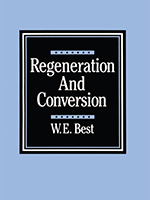 |
Regeneration and ConversionHow does a person become a true Christian? Many people believe they have to earn good standing with God by their upright moral behavior, including their choice to have faith in God. Salvation is entirely the work of a sovereign and gracious God. Regeneration is an immediate act of God that imparts the principle of life without any participation by men. Conversion is the beginning of a holy life, and is the first of many conversion experiences throughout the Christian's earthly pilgrimage. God doesn’t make bad people into good people; instead, He makes dead people alive, grants faith to believe the gospel, and transforms hearts so that we then want to obey Him. |
Download: |
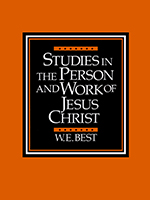 |
Studies in the Person and Work of Jesus ChristCommon teaching is expressed in the following words: “Jesus had the capacity to sin, but did not do so.” The point of view that Christ “could” sin is designated by the idea of “peccability,” and the fact that He “could not” sin is expressed by the term “impeccability.” Jesus Christ is impeccable. |
Download: |
 |
God Forgives SinnersThe “cleansing” flood of God’s forgiveness can be experienced only to the extent a person is utterly overwhelmed with sin and the need to be forgiven. The subject of forgiveness cannot be properly approached apart from the Biblical concept of sin, its origins, and its consequences. A person cannot fully appreciate forgiveness unless he knows who has forgiven him and of what he has been forgiven. We have no hope apart from God’s everlasting forgiveness through grace. |
Download: |
 |
Free Grace Versus Free WillThe same God who has ordained all events has ordained the free agency of man in the midst of the course of events He foreordained. The gospel is not forced on the elect against their wills (Ps. 110:3). Man has no ability to respond to God unless our wills are changed through regeneration by the Holy Spirit. God gives Christians faith to believe and obey. This change makes us willing to accept the gospel. Since salvation is entirely God’s sovereign and gracious act, it doesn’t depend on man, so it can’t be lost. |
Download: |
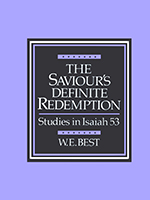 |
The Saviour’s Definite Redemption—Studies in Isaiah 53Many professing Christians are horrified by the phrases “particular redemption,” “limited atonement,” and “limited redemption.” However, all professing Christians limit redemption; it is limited either in its extent (the elect) or in its quality. Those who say Christ died for every one without exception limit its quality since the Bible states that many have and will die in their sins. The extent is limited (to the elect who are actually saved) by those who have a Biblical view of redemption. This is a verse by verse study of the prophecy in Isaiah 52:12 through chapter 53 of Jesus Christ who is the Servant of Jehovah in this passage. This study describes from both Isaiah’s prophecy 600 years in advance of the crucifixion and from the history of the New Testament the Saviour’s work of redemption, its extent, and God’s satisfaction with the accomplished work of salvation Christ obtained for the many He saves. |
Download: |
 |
The Church—Her Authority and MissionChristian distinctives are clearly demonstrated in ecclesiology – the science of the church. Some have emphasized the local aspect of the church to the exclusion of the universal aspect, and others have stressed the universal aspect to the minimizing of the local. Spiritual authority in the local aspect of the church has been committed to elders. Physical authority in the local aspect of the church has been assigned to deacons. The mission of the church is to proclaim the gospel of the Lord Jesus Christ to all nations and teach the converted to observe all things for their edification. |
Download: |
 |
Christ Emptied HimselfThe Lord Jesus Christ is one Person with two Sonships. He is both the Son of God and the Son of Man. The Son of God in the bosom of the Father was pleased to condescend to become the Son of Man. He willingly assumed human nature in order to reveal the Father, redeem the elect, and communicate the knowledge of God to His people. Christ, during the days of His humiliation, did not consider His future honor of equality with God before men something to be seized. He was willing to spend and to be expended in the ultimate sense for the elect. In His holy life, Christ said, “...the Son of man came not to be ministered unto, but to minister, and to give his life a ransom for many.” |
Download: |
 |
Christ Could Not Be TemptedWe often hear about Jesus’ “temptation in the wilderness” or that He is “tempted just like we are.” The idea that Jesus Christ could be tempted is unfounded in the Biblical concept of Christ’s Person. Since Christ did not have a sin nature, solicitation to do something contrary to God’s will could not be entertained in His holy thought. The New Testament Greek verb for tempt can also mean to test or to try; and the Greek noun for temptation can also mean a test or a trial This study will show there is no justification for translating these words as “temptation” or “to tempt” when they are used in reference to Jesus Christ. The perfect Son of God didn’t have a sin nature, so He couldn’t possibly be tempted. |
Download: |
 |
God Is LoveIn this age of “Smile, God loves you,” it is imperative that the Biblical view of God’s love be boldly declared. The most tragic theological error of our day is the belief that love is the chief attribute of God and led to the error of “love is God.” God who is love is maligned in this century by representing Him as loving without any regard for righteousness. God’s love is never separated from His law or His judgment. In fact, the love of God shines most brightly when we realize how much our sins deserve His righteous wrath. |
Download: |
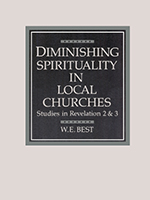 |
Diminishing Spirituality in Local Churches—Studies in Revelations 2 & 3This is a study of the letters to the churches in Revelation 2 and 3. The seven churches represent local churches of every age. God commanded, condemned, warned, rebuked, and gave promises to the seven churches. The call to each of the seven churches is to hear. Seven lessons should be learned from the seven churches. Overcomers in each of the churches are comforted by the triune God because of their position in Christ. |
Download: |
 |
Eternity and TimeTime is transitory presence in contrast to eternity which is abiding presence. Since time presently coexists with eternity, man who is a creature of time has difficulty differentiating between them. Man’s short time on earth bears a never ending relationship to eternity. Time, as we know it, will end someday, but God will usher in a New Heaven and New Earth, and believers will have resurrected, immortal bodies. There, we will worship and serve God forever, enjoying an “eternal weight of glory.” |
Download: |
 |
Woman—Man’s CompletionWith the degeneration of God’s first institution, the home, society in general degenerates accordingly. The greatest contributor to a deteriorating society is the departure from God’s teaching concerning the home. This study takes us through the opening chapters of Genesis and traces the role of men and women in the home through the Bible. God’s original teaching on any subject must never be ignored. Therefore, man and woman in the institution of marriage for life was and is God’s standard. |
Download: |
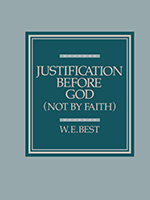 |
Justification Before God (Not by Faith)The average professing Christian says the word “justify” means to make one righteous before God. If that is true, does a person’s faith or his works make him righteous before God? This study shows what saving faith is not, what saving faith is, and that justification before God is by Christ’s righteousness imputed to Christians. Neither faith nor works make a person righteous before God. Although God, faith, and works all declare the elect to be righteous, the declarations are before different persons and for different reasons. (1) The elect are justified before God on the basis of imputed righteousness. (2) The person justified before God is justified by faith before his own consciousness. (3) The person justified before God and before his own consciousness is justified by works before others. |
Download: |
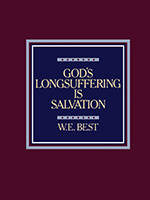 |
God’s Longsuffering Is SalvationThis is a study of 2 Peter 3:9, and a companion book to The Most Neglected Chapter In The Bible (Romans 9). Both are primarily a discussion of God’s election of some to salvation and His passing by others. “The Lord is not slack concerning his promise, as some men count slackness; but is longsuffering to us-ward, not willing that any should perish, but that all should come to repentance.” |
Download: |
 |
The Most Neglected Chapter in the Bible (Romans 9)This is a study of Romans 9, and it is a companion book to God’s Longsuffering is Salvation (which is a study of 2 Peter 3:9). Both are primarily a discussion of God’s election of some to salvation, “vessels of mercy,” and His passing by others, “vessels of wrath.” |
Download: |
 |
Life Brought to LightThis is a study of II Timothy 1:8-10. This text shows God’s order of salvation and the purpose of the gospel. The design of the gospel was not that it should be the means of giving the principle of life but that it should bring the gift that was given by the sovereign Spirit to light. Regeneration is the gift of new life. Saving faith is the fruit of that new spiritual life which responds to God’s call, and the transformed heart is called to a holy life by sanctification and then resurrection to immortality. Christians are, first to last, unworthy but glad recipients of God’s gracious gifts. |
Download: |
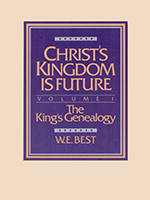 |
Christ’s Kingdom Is Future Volume 1: The King’s GenealogyThe hope of the kingdom has its foundation in the covenants of eternity and time. This study presents the genealogy of Jesus Christ in Matthew 1 in the context of God’s covenants. The kingdom prophesied in the Old Testament is the same kingdom that is taught by Jesus Christ and the apostles in the New Testament. |
Download: |
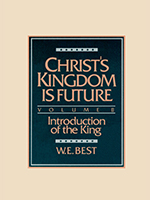 |
Christ’s Kingdom Is Future Volume 2: Introduction of the KingThis study introduces the King and His Kingdom. The coming of the King includes the incarnation of Jesus Christ, His mother, the King’s forerunners, Christ’s baptism, the testing in the wilderness, and the details of Joel’s and John’s baptisms and their prophecies of the King. The coming of the kingdom includes the prophecies of its coming, its definition, its approach, and its preparation from the foundation of the world. |
Download: |
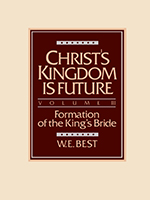 |
Christ’s Kingdom Is Future Volume 3: Formation of the King’s BrideThe definitions of Israel, the assembly (church), and the Kingdom are explained; and the foundation, birth, nature, mystery, and unity of the assembly (church) as the Bride of Christ is examined. God is currently preparing His assembly, the church, His bride, to be ready for Christ’s return. Jesus Christ assumed human nature in order to bring Himself into reality with His covenant people, both elect Jews and elect non-Jews. The current age is a time of preparation for God’s people. |
Download: |
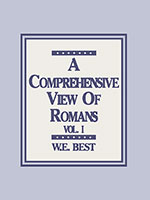 |
A Comprehensive View of Romans: Volume 1This is a study of Romans 1:1 through 3:18, including the theme of the book in 1:17: the righteousness of God which the gospel reveals. Paul begins by showing us that we are helpless and hopeless apart from the saving work of God. God must open our eyes to our depravity before declaring the remedy beginning with Romans 3:24. |
Download: |
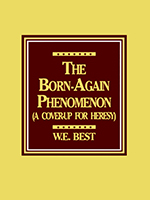 |
The Born-Again Phenomenon (A Coverup for Heresy)Jesus Christ told Nicodemus, “You must be born again,” but what did He mean? This verse-by-verse study of John 3:1-21 examines the three views of regeneration: baptismal regeneration, faith regeneration, and Spirit regeneration. |
Download: |
 |
Simple Faith (A Misnomer)This study distinguishes between God-given, saving faith and human faith, and examines the Scriptures for God-given faith theologically within the eternal covenant of grace, textually as the order of salvation is revealed in the Bible, and experientially as Christians grow in love, faith, and joy. |
Download: |
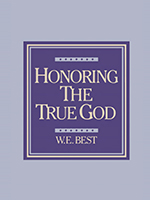 |
Honoring the True GodThis pamphlet teaches some of the key differences between Biblical Christianity and man-made religion. All the debate over the inerrancy of Scripture manifests the heart trouble of religionists. Biblical Christianity alone honors God. |
Download: |
 |
No Proper Name Given to Christ’s AssemblyThis pamphlet studies the New Testament Greek term ekklesia (called out ones, assembly, congregation, or church) and how a church is Biblically named and functions—not as a denomination. |
Download: |
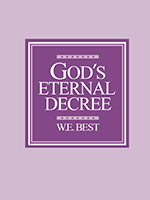 |
God’s Eternal DecreeThis pamphlet studies God’s decree in Scripture, the different views used to describe it (supralapsarianism and infralapsarianism), and the order in God’s purpose and His execution of it. |
Download: |